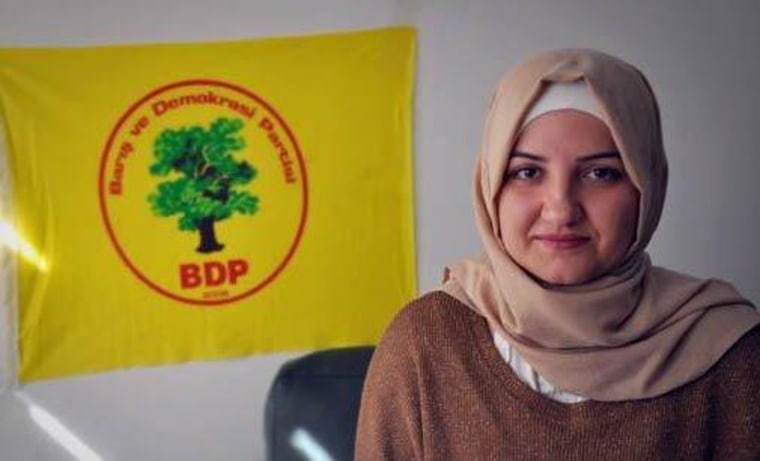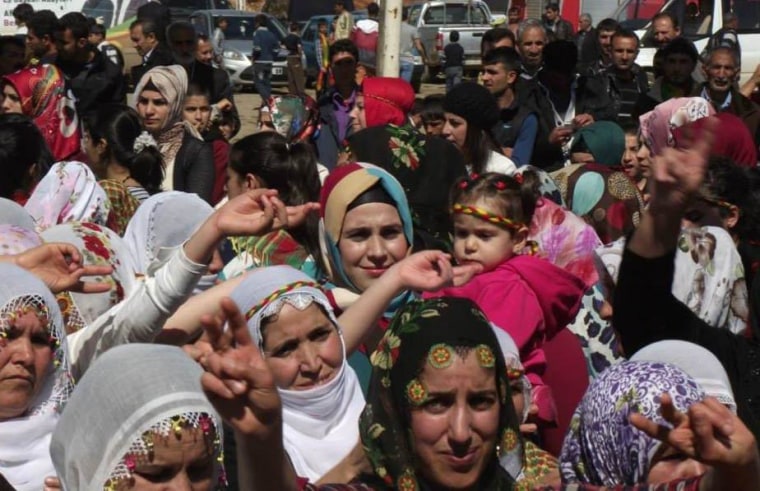Berivan Kilic spent most of her life behind closed doors. Raised in southeastern Turkey during the height of a violent conflict, her parents pulled her from school when she was 11 to shield her from the gunshots and arson that were ravaging villages near their home. At 15 she married, like many other girls in her traditional village, and moved to her husband's house, which quickly turned into a prison.
“He tortured me,” Kilic says. “Psychologically and physically from the very first day.”
Often confined to her home, she had no friends to confide in when her husband -- a cousin -- began to beat her, so she suffered alone for 14 years until she summoned the courage to leave.
Kilic's divorce -- the first, she says, in her community -- was just the beginning of a trailblazing path that recently led to her election as the first female mayor of her district at the age of 33.
Her victory, one of several historic wins for female candidates in local elections in March, has transformed her into a symbol of hope for women far beyond her farming village of Kocakoy.
“People believe me when I speak,” Kilic says. “I don't just tell stories of abuse – I lived it.”
Though men and women in Turkey have equal rights on paper, in practice, it's another thing. “In general there is this feudal mentality,” Kilic says. “Men can do whatever they want but women can't.”
According to government statistics, women account for just 30 percent of Turkey's workforce. Four in 10 Turkish women polled in a widely cited 2009 study, meanwhile, said they had been victims of domestic violence -- something that peeks out from behind the walls every now and then, when a story of marital murder or an honor killing makes the evening news.
“Men can do whatever they want but women can't.”
For years Kilic submitted herself to the cultural codes that reign supreme in her deeply traditional corner of the country. She married, had children and tolerated her husband's violence without saying a word, although everyone in her community knew. Her mother, who arranged the marriage with the best intentions, watched on with a broken heart, hoping that time would cool her son-in-law's temper. Kilic turned to the Quran, searching for passages that could explain her suffering, before finally deciding to direct her own fate.
“If this makes me rebellious, then I'm rebellious,” she says.
Her decision to leave her husband was not easy. While women in Turkey are free to pursue a legal divorce, Kilic says that women in her village adhere to strict cultural norms instead. “Here, a woman who wants to leave has two choices,” she says. Marry another man, leaving any children with their ex-husband's family, or “fall into the streets.”
She did neither. Her mother -- a 54-year-old, who has been married since she was 12 -- convinced her own husband to take their eldest daughter back in. “Her father was saying, this is your husband, you must work it out,” Aisan Kilic says. “But I said, if it's not working, come home.”

With her family's support, Kilic moved her two sons -- the eldest suffering from an undiagnosed disability that makes it difficult for him to walk and eat on his own -- into the modest two-room home where she grew up. To avoid becoming a financial burden on her family, she started her own hair cutting business and picked up her education from where she left off, studying a middle school curriculum at home -- endeavors that both scandalized and inspired people in her village who had never seen such a woman before.
Five years after her divorce, she decided to join the Kurdish Peace and Democracy Party or BDP, a political party dominant in the southeast of the country where many Kurdish minorities live. The party was campaigning for more women to join and she felt intrigued enough to wander in one day to the dusty BDP office around the corner from her house.
She was honest with the men in the open room who asked about her background: She had no political experience, but was willing to learn; she had little education, but was studying; she was divorced, but it was an abusive marriage.
A week later, a man from the office called her back to ask if she would not only join the party, but run for district mayor. Three months later she won.
This year was the first time the BDP -- a party that touts gender equality as one of its core values -- extended a pioneering system, aimed at getting more women into politics to all levels of local government. Under the system, a male and female candidate were selected to run on a single ticket in participating districts and, if elected, serve together as co-mayors. Kilic, for example, ran and now serves with a man, Afullah Kar. The change brought more than 50 women into mayoral positions, according to Kader, a Turkish organization that campaigns to get more women into politics.

Zafer Berkal, chairwoman of Kader, says the BDP's new system should serve as an example to the country's larger and more influential parties. “This was not the women candidates' success,” she says. “This was a decision coming from BDP's management and this model is ideal.”
Under their system, about 40 percent of nominations went women, causing some controversy among critics -- both male and female -- who worried about women taking on such public roles. Kilic's own extended family implored her parents to stop her from running. “How will you allow her to shake hands with men?” they asked.
Yet voters interested in supporting the BDP were forced, in many districts, to vote for women – some running with men and others on their own – and by and large, they did.
The BDP dominated its Kurdish stronghold in the southeast, with victories going to the majority of women who ran on both single and shared tickets, according to Kader data.
Still, the party won just a fraction of votes nationwide, while dominant political parties added very few females to the mix. “Apparently we have more work to do,” Berkal says.
Despite the long road ahead, women in Turkey have steadily, if slowly, been gaining political ground. During the last general election, for example, women's membership in Parliament jumped to 14 percent from 9 percent the previous term. Last October, the government also reversed a decades-long ban that prohibited women who wear headscarves -- the majority of women in the country -- from wearing the religious covering in civil service jobs. Though critics feared the government was less interested in fostering equality than pushing a religious agenda, rights groups largely backed the move, viewing it as an opportunity for more women to enter the workforce and run for office.
“Now women can come directly to me,” Kilic says. “After the election this happens every day.”
Kilic, who wears a headscarf, is not only taking advantage of the changed law, she is also challenging the much more influential cultural rules that dictate women's roles outside the home.
She explains that before she took office, women had to send male relatives to the male mayor on their behalf. “Now women can come directly to me,” Kilic says. “After the election this happens every day.”
Besides giving women a direct line to a government representative, Kilic is also using her difficult past to inform decisions that might help other victims of domestic abuse. One of her top priorities is finding women opportunities to work, which she says will be more effective than a women's shelter. She's already planning to open a market where women can sell handmade goods and is mulling ways for women who milk cows to find more buyers for their dairy products.
She's also trying to tackle a mountain of other needs – from starting a village garbage system to finding money for a few school soccer balls. She does all this, plus learning on the job, working toward a high school degree and using her new income to improve the life of her family.
“They always lent me their support,” she says. “Now I will provide them the standards they deserve.”